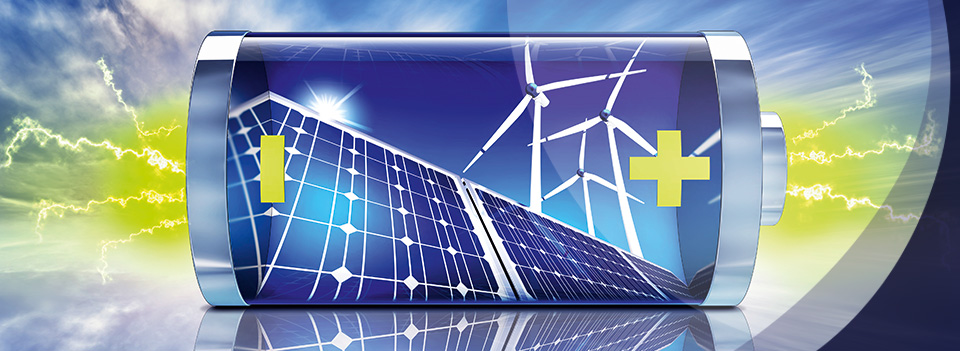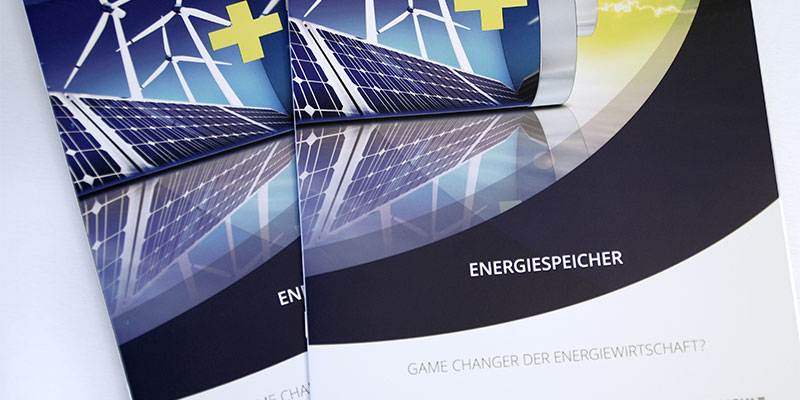Energy storage
As volatile power generation from wind and photovoltaics expands, energy storage has become a key component of the energy transition by balancing load fluctuations and assisting in matching power supply with consumption load.
Energy storage solutions becoming established in the market
The energy storage market in Germany shows a constant growth across all storage technologies. The pumped-hydro storage, thermal storage and home, industrial and large-scale battery storage segments combined achieved a revenue volume of around 5.5 billion EUR in 2020. Pumped-hydro storage still accounts for the largest share of the overall revenue, followed by industrial battery storage. A strong growth has been seen in the area of home battery storage in recent years.
Revenue by segments (left) and overall revenue development (right)
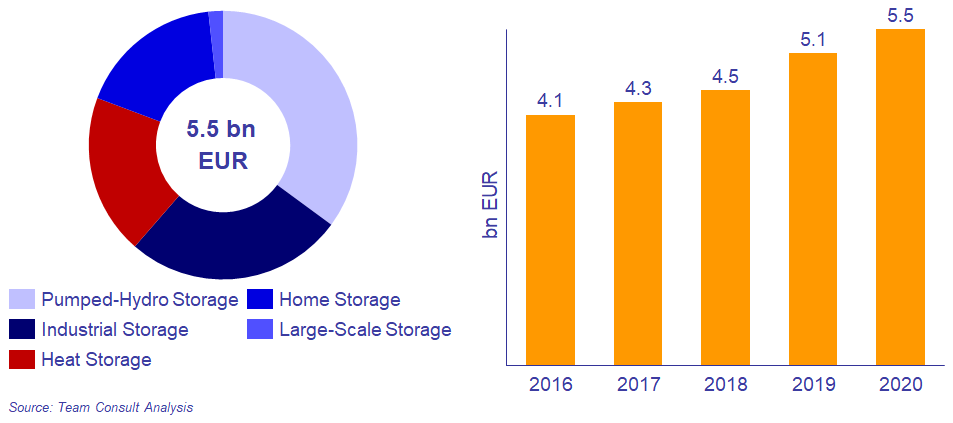
The various storage technologies have different characteristics, for example in terms of storage capacity and storage duration, which strongly influence their suitability for different applications.
Storage duration and capacity range of different storage technologies
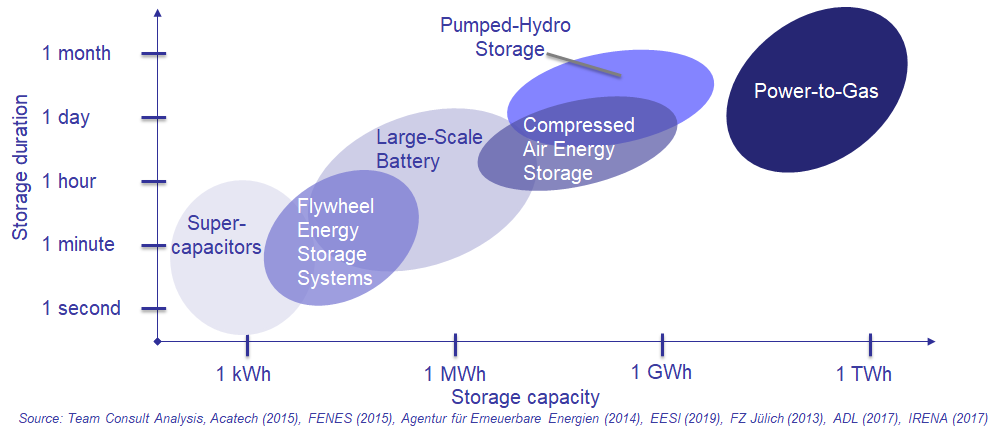
Energy storage systems offer a variety of different application possibilities. These include the provision of control energy, trading on the spot market for power price arbitrage, optimizing self-consumption of PV electricity based on home battery storage (for residential customers), as well as smoothing the customer's individual consumption profile and reducing the necessary grid connection power (and thus saving on grid fees) in industrial applications.
Declining costs and falling revenue potential for large-scale battery storage systems
Large-scale battery storage systems have shown steady growth of the installed capacity in Germany in recent years. Starting from less than 10 MW in 2014, more than 500 MW of power are currently installed in Germany. These are mostly used for the provision of frequency containment reserve (FCR), but increasingly in combination with other applications such as power price arbitrage (multi-use) due to falling frequency containment reserve prices.
Development of investments costs (left) and FCR prices (right)
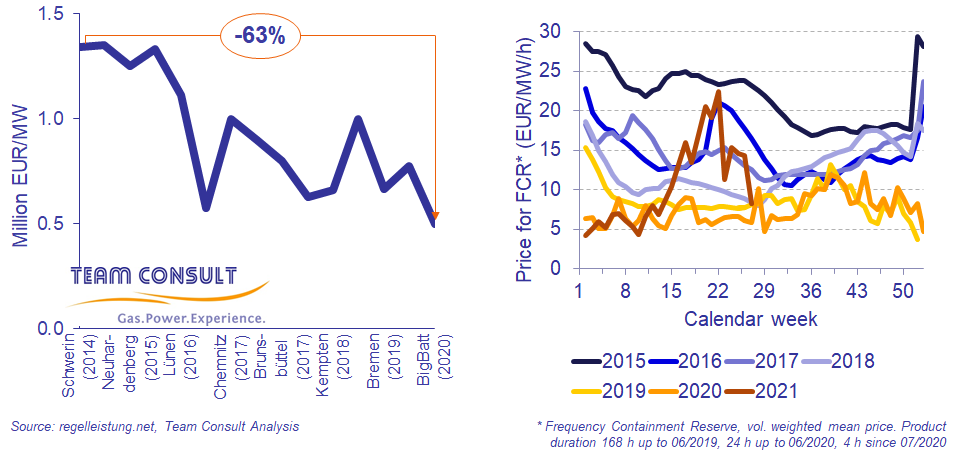
In our large-scale battery storage database, all battery storage systems with a capacity of more than 100 kW that are connected to the German public power supply system are listed and the most important parameters such as investment costs, installed capacity, field of application and the energy storage technology used are evaluated. Among other things, this allows analyses to be carried out on the individual use cases and business models as well as the development of investment costs.
Consulting Services
- Market analyses and expert reports
- Development of business models for traditional utilities and new entrants
- Consulting of manufacturers with regard to marketing and distribution potential
- Support of infrastructure operators to evaluate chances and risks
- Due Diligence for investors
Publications
Batteries and hydrogen in Germany: Comparing crucial components for a modern energy system
November 2020
What are the roles of battery storage and hydrogen in the clean energy system of the future? Matthias Simolka takes a look at the roles each plays today and where we might see the dynamics go from here, with regard to everything from large-scale renewables integration to electric transport.
You can read the whole article here.
dena publishes Team Consult study on large-scale batteries
September 2020
A substantial growth in large-scale battery (LSB) installations in German over the last years offered the opportunity to evaluate the experiences made in Germany with LSBs and to summarize the main insights to make them available for use in the energy industry and energy policy in other countries. In the context of the German-Turkish cooperation in the energy sector and supported by the Federal Ministry for Economic Affairs and Energy of Germany, the German Energy Agency (dena) assigned Team Consult with the preparation of a respective study. This study, titled “German experiences with large-scale batteries – Regulatory framework and business models”, has now been published and is available for download from dena’s website.
Current developments in the German large-scale battery market
January 2020
Within 2019, a total amount of 79 MW of large-scale battery projects was completed in Germany. Compared to the large-scale battery projects completed in 2018, which summed up to 157 MW, the installed power of the newly completed projects reduced significantly. The main reason for the reduction in the newly completed large-scale battery projects in 2019 is presumably the decline of the prices at the primary control energy market, which represents the primary field of utilization in Germany for large-scale batteries.
The total amount of installed power of all large-scale batteries within Germany summed up to 428 MW at the end of 2019. Considering the local distribution within Germany, a clear separation between northern, wind rich and the southern Germany with lower wind power potential is observed with more than 75% of the installed large-scale battery power being located north of the “Main river”, which is used by the German Federal Network Agency so separate North and South of Germany based on system relevant power plants (we allocate the following federal states to the north of the “Main river”: North Rhine-Westphalia (NW), Schleswig-Holstein (SH), Brandenburg (BB), Lower Saxony (NI), Bremen (HB), Saxony (SN), Mecklenburg-Western Pomerania (MW), Hamburg (HH), Saxony-Anhalt (SA) and Berlin (BE)). This distribution is explained by the high installed generation capacity of renewable energies in the north of Germany, especially of wind power. The fluctuating power generation makes a balancing necessary, to which the large-scale batteries contribute.
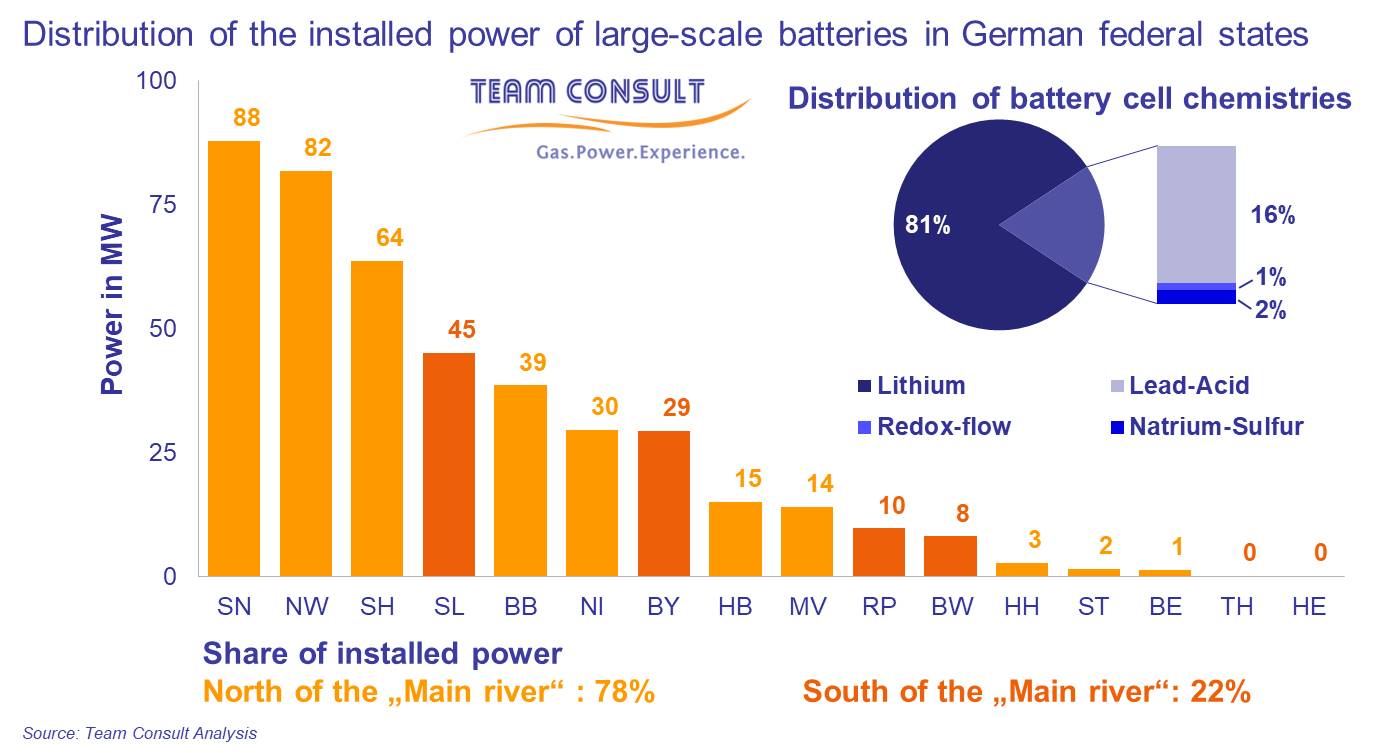 Regarding the utilized battery technologies, the Lithium-Ion technology has the considerably highest share of all battery technologies with 81%. Compared to the other battery technologies, it offers a high energy density, high charge and discharge power and additionally low self-discharge. Lead-acid batteries have a share of 16%, substantially less than the Lithium-Ion technology. The advantages of this reliable technology are the relatively low investment costs and the high operational safety.
Regarding the utilized battery technologies, the Lithium-Ion technology has the considerably highest share of all battery technologies with 81%. Compared to the other battery technologies, it offers a high energy density, high charge and discharge power and additionally low self-discharge. Lead-acid batteries have a share of 16%, substantially less than the Lithium-Ion technology. The advantages of this reliable technology are the relatively low investment costs and the high operational safety.
Redox-flow batteries with a share of 1% are currently only used in a handful of projects. The technology offers a high operational life and safety, combined with a low self-discharge. It offers an outstanding scalability, due to the storage of the electrolyte in tanks. However, the energy densities are relatively low and investment costs are higher compared to other battery technologies. Since 2017, the German utility company EWE is planning the construction of a redox-flow battery, which would use salt caverns to store the electrolyte. This redox-flow battery could reach an overall storage capacity of 700 MWh (which is nearly 1.5 times the current large-scale battery storage capacity within Germany). Nevertheless, the initial operation is currently expected only after 2025, due to technical and economic difficulties.
Team Consult analysis 2019 confirms significant growth of the German energy storage industry
March 2019
The German energy storage industry is still on track. Team Consult has conducted an analysis of the German energy storage market in cooperation with the German Energy Storage Association (BVES) and confirms the growth of the previous year impressively: The German energy storage industry has exceeded the revenue mark of 5 billion Euros in 2018. What's next? What are the challenges of the years to come?
More information can be found here.
Short report about the lifecycle extension of batteries from electric vehicles through stationary storage
December 2018
Electric mobility is gaining more and more relevance, which leads to an increased demand for batteries. As a result prices for battery cells have been increased recently by some automotive suppliers. A possibility for car manufacturers to avoid passing on higher costs to end customers is the extension of the life cycle of batteries. In that way additional revenues can be generated. A possibility for the lifecycle extension of batteries is the pooled usage in stationary large scale batteries.
A detailed description of these developments and possible consequences for investors and operators of conventional large scale battery projects is given in this report (PDF download, in German).
More than half of local distribution companies offer PV storage systems to end customers
September 2018
Recently the mark of 100,000 installed PV battery storage systems has been exceeded in Germany. Battery storage for households is no niche anymore. As a consequence many energy providers offer these storage systems to their customers. Team Consult has analyzed the product range of supra-regional suppliers and incumbents in major German cities. This analysis of almost 90 energy providers shows that more than half (56 %) offer battery storage systems to household customers, often in combination with PV systems. 17 % of surveyed companies offer solely PV systems without battery storage. More than a quarter of energy providers include neither PV systems nor battery storage in their product range.
Advantages and disadvantages of PV and battery sales activities need to be weighed thoroughly. On the one hand, an increased self-supply of household customers might lead to decreasing energy sales. This development however can hardly be stopped by renouncing respective sales activities, due to the product availability from other companies. On the other hand, PV and battery sales activities provide new revenue streams. By offering related services, such as maintenance and monitoring, a long term customer retention can be ensured. In order to implement a successful sales strategy energy providers have to take into account individual aspects like customer structure and other existing sales activities.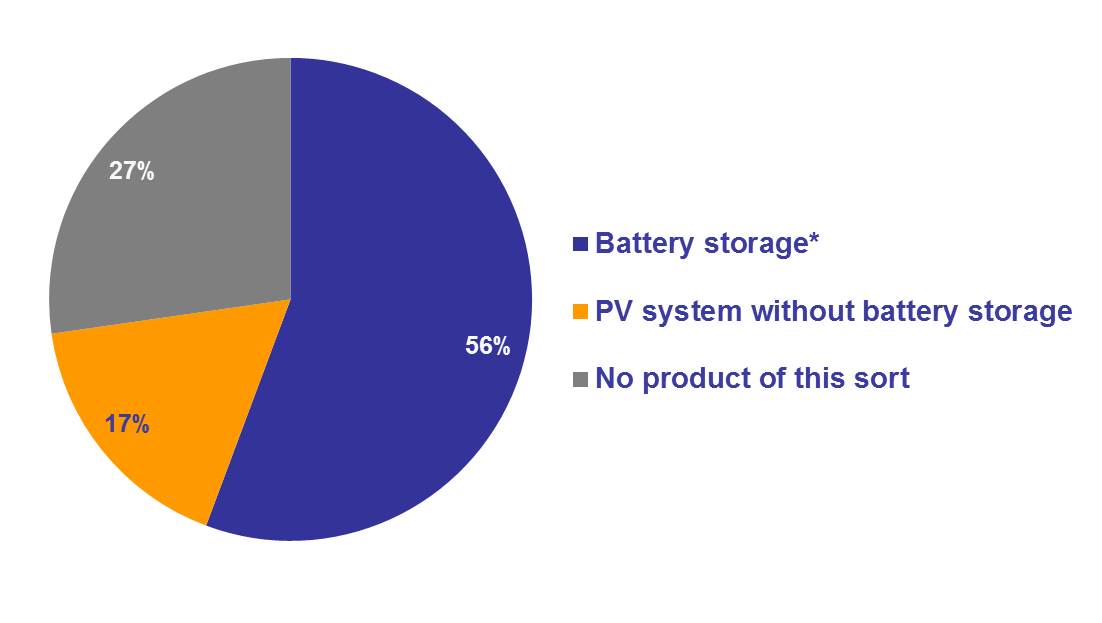 Figure: PV- and battery storage product range of local distribution companies in Germany
Figure: PV- and battery storage product range of local distribution companies in Germany
*partially in combination with PV system
Source: Analysis Team Consult
Team Consult evaluates relevance of the energy storage industry
September 2018
Energy storage systems are getting more and more attention in the light of the advancing transition of the energy system. However, so far there has been no quantitative basis for the evaluation of the relevance of energy storage systems and especially of the energy storage industry. On behalf of the German energy storage association (BVES), Team Consult has conducted an industry analysis to close this knowledge gap.
The highlights of our findings have been published in the September edition of the German journal “Energiewirtschaftliche Tagesfragen“.
Download publication in “Energiewirtschaftliche Tagesfragen”, September 2018 as PDF (in German)
Source: http://www.et-energie-online.de/
Storage monitoring by RWTH Aachen confirms Team Consult's analyses regarding the German PV storage market
July 2018
On July 16th the RWTHA Aachen published its annual storage monitoring report 2018, which contains inter alia information regarding the development of PV storage systems in Germany. According to the report there have been 31,700 newly installed PV storage systems in 2017, more than ever before in one year. Thereby the total number of storage systems of this kind grows up to 85,000 in Germany by the end of 2017, resulting in a cumulative storage capacity of 280 MW and 600 MWh.
These figures are very congruent with analyses of the German storage market carried out by Team Consult for the German Energy Storage Association (BVES) earlier this year. Team Consult expects a continuation of the positive development of the PV storage market in 2018, leading to a cumulative storage power of roughly 385 MW._ENG_20180720.png)
Significant growth of the German energy storage industry
March 2018
Team Consult has analysed the German energy storage market in cooperation with the German Energy Storage Association (BVES). Christoph Hankeln presented the results of the study at the Energy Storage Europe in Düsseldorf on 13 March 2018.
The study shows that the German energy storage industry generated revenues of 4.6 billion Euros domestically and abroad in 2017. In 2018, the revenues are expected to exceed 5 billion Euros for the first time. Furthermore, the number of employees is very likely to rise over 12,000. A particularly strong growth is expected in the segment of industrial battery.
More information can be found here.
New article about the development of battery storage in Germany published by Greentech Media
February 2017
Germany plays a leading role when it comes to the deployment of battery storage. 2017 is expected to be a year with a significant increase of small and large scale battery systems. TEAM CONSULT estimates that the installed capacity will threefold by the end of 2017 compared to the previous year.
The article “Germany`s Banner Year for Big Batteries”, published at Greentech Media, focuses on these developments and the consequences for the profitability of battery storage projects.
Source: www.greentechmedia.com
Large Scale Battery Storage for Power Grid Stabilization in Germany – Growth expected in 2017
January 2017
Germany’s power industry will expand installed capacities for grid stabilization more than three-fold in 2017, reaching up to 200 MW end of 2017 (60 MW end of 2016).
This is resulting from a study composed by TEAM CONSULT analyzing the market of energy storage.
An article about this has been published by Thomson Reuters.
Energy Storage capable of linking sectors in the context of Energiewende
January 2017
Christoph Hankeln, Business Unit Manager Energy Storage, has been interviewed about the findings of the TEAM CONSULT study “Energy Storage – Game Changer for the Energy Industry”. Within this study TEAM CONSULT analyses new technologies and solutions for the storage of energy in the context of the German energy transition.
Download energate messenger+ article as PDF.
New Article on Thermal Energy Storage/Power-to-Heat published
June 2016
Local distribution companies increasingly invest in thermal energy storage systems in order to allow for an economic operation of their co-generation power stations. In this scope, the integration of a power-to-heat module (PtH-module) to use excess electricity is often discussed as well. Which parameters are relevant to the investment decision? A current short study of Team Consult provides first answers. According to the study, investing into thermal energy storage may be profitable in the current market environment, while the market conditions for power-to-heat providing negative balancing energy have deteriorated.
The highlights of the results of the study have been published in the June edition of the “Zeitung für kommunale Wirtschaft“. For further information, please contact us by phone +49 30 400 556-0 or mail info@teamconsult.net. David Heinze will be glad to address your questions.

